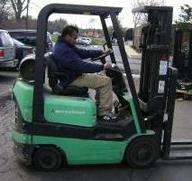Alternative Fuel Types
 Two types of alternative fuel that I would like to discuss would be LPG or liquid petroleum gas. And also CNG compressed natural gas.
Two types of alternative fuel that I would like to discuss would be LPG or liquid petroleum gas. And also CNG compressed natural gas.
Back 10 or 20 years ago, these two types of fuels were at the leading edge of most alternative fuel programs and were considered to be the wave of the future.
I was so convinced of this that I studied and became certified in CNG powered vehicles. Although both of these fuels are extremely interesting they are still both fossil fuels. This would seem to be the main reason that interest has faded in both of these types of fuels.
First, we will discuss LPG or liquid petroleum gas. Fuel grade LP is almost pure propane with a small amount of butane, which is why many people simply refer to it as propane.
They call this LP because it is stored as a liquid in a pressurized bottle. The most common containers look just like the one that’s mounted to your propane barbecue grill.
 You will also find many forklifts that still use this type of fuel. The LPG tanks that are mounted on the forklifts will look more like a beer keg.
You will also find many forklifts that still use this type of fuel. The LPG tanks that are mounted on the forklifts will look more like a beer keg.
Propane or liquid petroleum gas is perfect for a forklift that operates inside of a large warehouse.
These types of alternative fuel burn clean because the fuel is vaporized at atmospheric temperatures and pressures. This means that it emits less hydrocarbons and carbon monoxide.
These properties also allow for easy engine start up even in the coldest climates. This is probably why we will continue to see LPG powered forklifts operating in warehouses.
Even though LP gas is a good alternative to unleaded gasoline is still a fossil fuel. Therefore, you will probably not see the automotive industry develop this environmentally friendly fuel into a possible solution for the future.
More alternative fuel types
Compressed natural gas vehicles offer some advantages over their gasoline-powered counterparts. Even though CNG is a fossil fuel, it does cost less than regular unleaded fuel. It is also the cleanest alternative fossil fuel.
CNG generates up to 99% less carbon monoxide than gasoline. There is also almost no sulfur dioxide in the emissions as well as greatly reduced hydrocarbons.
CNG vehicles can be safer than most people realize. CNG is highly pressurized at about 3000 psi. But the fuel tanks used are designed to withstand severe crashes.
These CNG tanks are made of a composite material with plastic bladders, wrapped in fiber. They have done extensive testing exposing these tanks to burning and even direct gunfire.
These composite compressed natural gas tanks have passed tests that no sheet-metal gasoline tank would have passed.
Another advantage to CNG is that it generally reduces vehicle maintenance because it burns so much cleaner than liquid gasoline. Also note that natural gas is abundant and readily available in the United States.
Although the infrastructure could use updating to make the retrieval and processing of this gas more efficient.
Disadvantage of CNG
This type of alternative fuel also has a couple of disadvantages. The largest disadvantage of compressed natural gas in the present day is its limited distribution network.
Fuel facilities are needed in greater number than are currently in existence due to the relatively shorter range of CNG powered vehicles.
Also, the space taken up by the CNG fuel tank is considered a disadvantage to most vehicle manufacturers. These fuel tanks can also weigh more than a standard vehicle’s fuel tank.
Another disadvantage of CNG vehicles is the pressures that they run at. As I stated above, the fuel tank pressure is at around 3000 psi. This used to make fueling the tanks a very slow process, although these fueling systems have been recently updated to quicken the refueling of CNG powered vehicles.
So even though both of these types of alternative fuels offer many advantages to the automotive industry. The disadvantage that they are still fossil fuels seems to have killed the development of vehicles that are powered by them.
Leave your comments and opinions in the fields below. Also, let me know what you think the best type of alternative fuel of all time is.

